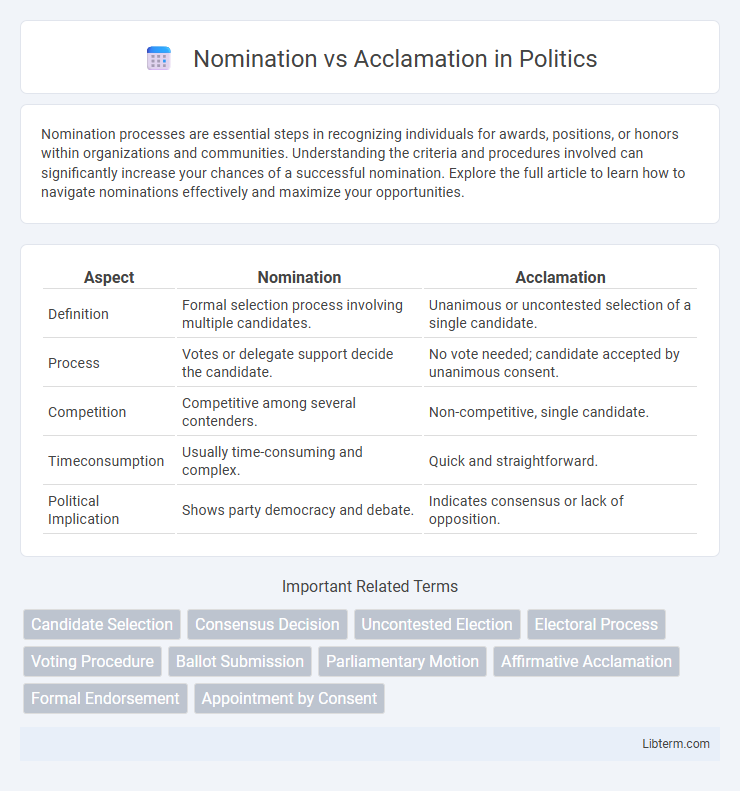Nomination processes are essential steps in recognizing individuals for awards, positions, or honors within organizations and communities. Understanding the criteria and procedures involved can significantly increase your chances of a successful nomination. Explore the full article to learn how to navigate nominations effectively and maximize your opportunities.
Table of Comparison
| Aspect | Nomination | Acclamation |
|---|---|---|
| Definition | Formal selection process involving multiple candidates. | Unanimous or uncontested selection of a single candidate. |
| Process | Votes or delegate support decide the candidate. | No vote needed; candidate accepted by unanimous consent. |
| Competition | Competitive among several contenders. | Non-competitive, single candidate. |
| Timeconsumption | Usually time-consuming and complex. | Quick and straightforward. |
| Political Implication | Shows party democracy and debate. | Indicates consensus or lack of opposition. |
Understanding Nomination: Definition and Process
Nomination is the formal process by which a political party or group selects a candidate to represent them in an election, involving methods such as primaries, caucuses, or conventions. The process ensures that multiple potential candidates are evaluated based on their qualifications, party loyalty, and electability before a final choice is made. Understanding nomination includes recognizing its structured procedures designed to promote democratic candidate selection and party consensus.
What is Acclamation? Meaning and Significance
Acclamation is a method of selecting a candidate by unanimous verbal agreement or applause during a meeting, bypassing a formal ballot process. This process signifies broad consensus and strong support, often reflecting unity and enthusiasm within a group or organization. By opting for acclamation, organizations demonstrate collective endorsement, enhancing legitimacy without the need for contested voting.
Key Differences Between Nomination and Acclamation
Nomination involves formally proposing a candidate for a position through a structured process, often requiring a vote or selection criteria, while acclamation occurs when a candidate is unanimously approved without opposition or a formal vote. The key difference lies in the procedure: nomination requires active selection among multiple candidates, whereas acclamation signifies unanimous agreement and often a lack of contest. Nomination is common in competitive elections, whereas acclamation is typical when a candidate runs unopposed or has overwhelming support.
Historical Context of Nomination and Acclamation
Nomination originated in the early 19th century as a formal political process where candidates were selected through party conventions, reflecting the rise of organized political parties and electoral campaigns. Acclamation predates nomination, rooted in ancient and medieval practices where assemblies or councils would unanimously approve a candidate without a formal ballot, emphasizing consensus and immediate acceptance. These distinct historical contexts highlight nomination's connection to modern democratic procedures and acclamation's role in traditional communal decision-making.
When is Nomination Used in Decision-Making?
Nomination is used in decision-making when a formal and structured process is required to select candidates or leaders, especially in organizations, elections, or committees. It typically involves proposing individuals who meet specific criteria, allowing members to consider and vote on multiple options. This method ensures fairness and transparency when multiple qualified candidates are available.
Scenarios Where Acclamation is Preferred
Acclamation is preferred in scenarios where a candidate runs unopposed or when there is overwhelming consensus among voters, allowing a quicker and more efficient decision-making process without the need for a formal ballot. This method is commonly used in small organizations, local elections, or during leadership appointments to reflect unanimous support and foster unity. Acclamation minimizes electoral costs and streamlines proceedings, making it ideal for uncontested or widely supported nominations.
Advantages of Nomination in Elections
Nomination in elections provides a structured and transparent process for selecting candidates, ensuring that all contenders meet specific criteria and have the opportunity to campaign formally. It fosters democratic participation by allowing party members and voters to evaluate multiple candidates, enhancing voter choice and legitimacy. Structured nominations help prevent unilateral decisions, promoting accountability and encouraging wider political engagement.
Benefits and Limitations of Acclamation
Acclamation streamlines the selection process by enabling unanimous agreement without a formal ballot, saving time and fostering unity among participants. This method enhances group cohesion by highlighting consensus, but it can also suppress minority opinions and limit thorough evaluation of candidates. The risk of overlooking alternative options and reducing democratic deliberation presents a key limitation in acclamation-based decisions.
Real-World Examples: Nomination vs Acclamation
In the 2020 U.S. presidential election, Joe Biden secured the Democratic nomination after a competitive primary process, demonstrating the traditional nomination method through delegate votes. Conversely, acclamation occurred in smaller party conventions or local meetings where candidates, such as some city council hopefuls, are unanimously approved without opposition, reflecting consensus rather than contest. Real-world examples highlight nomination as a democratic selection involving multiple candidates, while acclamation emphasizes unity and uncontested endorsement.
Choosing the Right Method: Factors to Consider
Choosing between nomination and acclamation depends on the context, group size, and formality of the election process. Nomination is ideal for larger organizations or formal settings where multiple candidates need vetting, ensuring transparency and democratic participation. Acclamation works best in smaller, cohesive groups or when a single candidate stands uncontested, streamlining decisions and reflecting unanimous support efficiently.
Nomination Infographic

 libterm.com
libterm.com